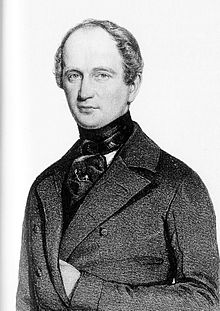Constantin Franz von Neurath
Constantin Justus Franz Johannes von Neurath , baron von Neurath since 1851 , (born April 22, 1807 in Wetzlar ; † September 8, 1876 in Leinfelderhof ) was a German lawyer and diplomat. He was Foreign Minister of the Kingdom of Württemberg.
Life
Constantin von Neurath attended high school in Stuttgart. He studied law at the Eberhard Karls University of Tübingen and became a member of the Corps Allemannia I on November 18, 1824. He moved to the Ruprecht Karls University of Heidelberg . He passed the two higher judicial service exams as the best test subject . After joining the judicial service of the Kingdom of Württemberg , Neurath worked at various higher regional courts. In 1839 he became a councilor at the district court in Esslingen . In 1840 he was promoted to the position of director in the Ministry of Justice. Also in 1840 he became secret legation councilor of the Württemberg Foreign Ministry. He stayed in the diplomatic service in Europe until the March Revolution , but then withdrew into private life from 1848 to the end of 1850, as he rejected the efforts of the revolution that finally failed. He was a participant in the Ministerial Conference of all federal states from December 23, 1850 to May 15, 1851 in Dresden . This was followed by his political reactivation. His family was raised to the hereditary Württemberg baron status in 1851. On April 12, 1851, King Wilhelm I appointed him a member of the Chamber of Jurors for life. On May 8, 1851, Neurath took over the chairmanship of the Privy Council , although his official appointment as president of this body did not take place until April 24, 1855. From May 8, 1851 to July 14, 1854, Neurath was head of the Foreign Ministry , and since February 20, 1852 with the title of Minister. Because of a press release initiated by King Wilhelm, which aroused Neurath's displeasure, he asked for his release in July 1854. When King Karl took office , the heads of departments were reassembled. In the new Varnbüler ministry , Neurath was the head of the justice ministry from October 4, 1864 until he entered the retirement requested after the German war on April 27, 1867. Neurath wanted to save as much of Württemberg's independence as possible and was able to pursue the policy of concessions from Karl von Varnbuler to the victorious Prussia . From 1868 to 1870 Neurath was a member of the customs parliament with this critical attitude . In the election to the customs parliament, Neurath won 92 percent of the votes cast in the constituency of Ravensburg-Wangen-Leutkirch-Tettnang. This was the best result of all candidates in Württemberg.
Family background
Constantin von Neurath's father Constantin Franz Fürchtegott von Neurath (* 1777; † 1817) was Württemberg Minister of Justice for a short time in November 1817. The maiden name of the mother Charlotte (1789-1869) was from Erath to Erathsberg. Constantin von Neurath married Emilie Freiin von Reck auf Autenried (* 1818, † 1858) in 1841, from whom he had two children. His son Konstantin Freiherr von Neurath (1847–1912) was Lord Chamberlain of the King of Württemberg and was a member of the Reichstag from 1881 to 1890. He was the father of the future German Foreign Minister Konstantin Freiherr von Neurath .
Honors
- Order of the Württemberg Crown , Grand Cross (1856)
See also
literature
- Karl Moersch: Things are strange in Württemberg. From extraordinary ideas and résumés , DRW-Verlag, Stuttgart 1998, pp. 188–209
- Frank Raberg : Biographical handbook of the Württemberg state parliament members 1815-1933 . On behalf of the Commission for Historical Regional Studies in Baden-Württemberg. Kohlhammer, Stuttgart 2001, ISBN 3-17-016604-2 , p. 612 f .
Web links
- Works by and about Constantin Franz von Neurath in the German Digital Library
- Constantin Franz von Neurath in the database of members of the Reichstag
Individual evidence
- ↑ Rainer Assmann , Ernst Napp and Ingo Nordmeyer: Die Tübinger Rhenanen (corps list and corps history) , 5th edition 2002, p. 395.
- ↑ Court and State Manual of the Kingdom of Württemberg 1866, p. 32.
| predecessor | Office | successor |
|---|---|---|
| Joseph von Linden | Head of the Württemberg Ministry of Foreign Affairs 1851–1854 |
Joseph von Linden |
| personal data | |
|---|---|
| SURNAME | Neurath, Constantin Franz von |
| ALTERNATIVE NAMES | Neurath, Constantin Justus Franz Johannes Freiherr von (full name) |
| BRIEF DESCRIPTION | German lawyer, Württemberg diplomat and minister |
| DATE OF BIRTH | April 22, 1807 |
| PLACE OF BIRTH | Wetzlar |
| DATE OF DEATH | September 8, 1876 |
| Place of death | Leinfelderhof |
